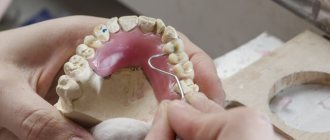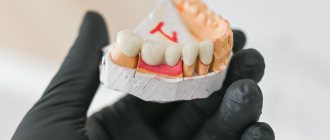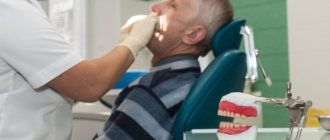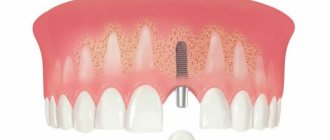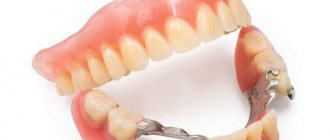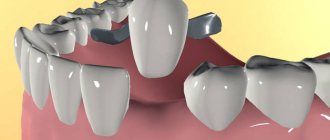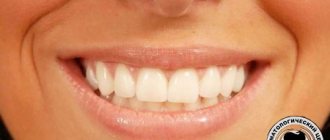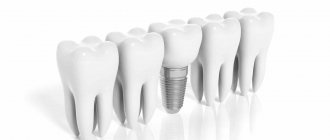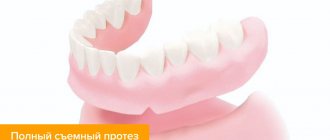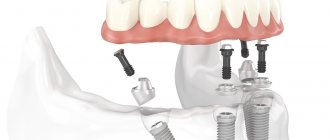Prosthetics for dental defects not only has an aesthetic function - it is an important stage in restoring chewing efficiency, on which the overall health of the body directly depends. In the absence of one, two, or maximum three teeth in a row and the presence of two supporting teeth, as a rule, the method of fixed prosthetics with bridges is used. These designs have excellent aesthetic characteristics, and their production takes from several days to 2-3 weeks.
Metal-ceramic dentures are one of the most popular types of fixed prosthetics.
Advantages and disadvantages
Metal-ceramic crowns are one of the most popular types of prosthetics. The list of advantages of this technique includes:
- strength: the metal frame allows the structure to maintain its integrity even under conditions of high chewing load;
- comfort: a properly made prosthesis ideally replaces a lost tooth, does not injure the gums and mucous membranes, and also allows you to speak and chew freely;
- preservation of bone tissue: when fixing the crown to its own root or implant, bone atrophy is excluded;
- durability: with proper care, dentures last for years;
The main disadvantage of metal ceramics is the impossibility of prosthetics for the front teeth, since the metal base is visible through the surface layer.
Care and features of using metal-ceramic structures
For those who need a relatively inexpensive and aesthetic fixed prosthesis, metal ceramics, the price of which is quite reasonable, is the ideal choice. It is easy to care for and requires the same care as your own teeth. You should brush your teeth at least twice a day after meals, and be sure to rinse your mouth after eating during the day.
Make an appointment with a doctor
- +7
- Smolenskaya st., 9 Make an appointment
- St. Badaeva, 6, bldg. 1 Make an appointment
- Menedeleev Boulevard, 9, bldg. 1 Make an appointment
- Turistskaya st., 10 Make an appointment
Stages of prosthetics
The installation of metal-ceramic crowns takes place in stages:
- preliminary examination of the patient and drawing up a treatment plan;
- sanitation of the oral cavity with the removal of plaque and tartar, treatment of caries, inflammation of the gums and periodontal disease;
- preparing the tooth on which the crown will be installed: filling the canals (if it has not been done previously), turning for subsequent fastening of the prosthesis;
- taking impressions and transferring them to a dental laboratory, where a specialist will make the prosthesis itself; During manufacturing, a temporary plastic structure is placed on the tooth;
- fitting of the prosthesis: if the patient experiences discomfort, the crown is given to the technician for revision;
- final fixation with dental cement.
How to care for metal-ceramic crowns?
Oral care after dentures is simple. Several rules must be followed:
- You should not test the strength of metal ceramics by cracking nuts with your teeth, opening lids, or biting threads. Excessive load can lead to chipping of the ceramic layer.
- When brushing your teeth, you need to pay special attention to the areas where the crown comes into contact with the gums, as food particles can get stuck in this gap. The best way to remove them is to use a waterpik after brushing and flossing.
- Once a year, it is recommended to carry out a professional oral hygiene procedure to remove bacterial plaque and tartar.
Indications and contraindications
Installation of metal-ceramic crowns is carried out in the presence of the following problems with chewing teeth:
- destruction of the coronal part by 2/3 or more due to mechanical damage or treatment of caries;
- malocclusions that cannot be corrected with orthodontic systems;
- cracks or chips of the crown part;
- increased abrasion of enamel.
Crowns can also be used when one or more teeth are completely missing; in this case, they are fixed to an implant.
Prosthetics are not possible in the following situations:
- high tooth mobility due to periodontal diseases;
- allergy to the materials that make up the structure;
- inflammatory focus in the oral cavity;
- the patient's serious condition due to diseases of the internal organs;
- mental disorders that do not allow free contact with the patient.
Types of metal-ceramic crowns
The quality of metal-ceramics is determined by the material from which the artificial tooth frame is made. Let's look at the advantages and disadvantages of different types of metal-ceramic crowns.
Alloys based on precious metals
Gold, platinum, and palladium are used to make the frame. The alloys of these metals have a light yellow tint, which, along with the biological inertness of the materials, explains the main advantages of crowns:
- The natural shade of the surface in any direction of light allows the use of such restorations in the smile area.
- It is extremely rare to cause intolerance reactions.
- They do not oxidize under the influence of saliva, which significantly increases the service life of the product.
- When in contact with the edge of the gums, they do not cause darkening of the soft tissues.
- Compared to alloys of base metals, the natural shade of the restoration can be achieved with a thinner layer of ceramics. This allows you to reduce the thickness of the entire structure and ensure the minimum possible gap between the tooth and the crown during installation.
In terms of cost, gold-platinum crowns are on average twice as expensive as metal-ceramics on a frame made of base metals.
Titanium metal ceramics
Titanium is actively used in all areas of medicine due to its strength and absolute bioinertness. Titanium crowns with ceramic coating are valued by dentists for:
- No intolerance or allergy reactions.
- Lightweight structures, which is important for long prostheses.
- Corrosion resistance.
- Durability. Often a person can wear a titanium metal-ceramic crown throughout his life.
The disadvantages of titanium restorations include technical difficulties associated with the manufacture of products. Only special titanium ceramics can be applied to a titanium frame. During implantation, titanium crowns can only be installed on titanium implants and abutments.
Base metal alloys
Alloys of various compositions are used in dentistry. For example, the advantages of a cobalt-chromium alloy are high hardness, strength, biocompatibility, and corrosion resistance.
The disadvantages of such alloys included:
- Possible allergic reactions, especially if the alloy contains nickel.
- Darkening of the gums at the point of contact of the soft tissues with the inner layer of the crown.
- The unaesthetic appearance of the crown, when when the gums sag, a gray metal rim becomes noticeable at the point of contact between the tooth enamel and the crown material.
- Unnatural appearance of restorations, which limits their use for restoring anterior teeth.
Now, metal-ceramics are made with an all-porcelain edge (with a shoulder mass): an additional layer of ceramics completely isolates the metal base from contact with saliva and the gum edge, thereby preventing the development of undesirable effects.
Advantages of the clinic
Doctors at the Kolibri clinic use the most reliable methods of dental prosthetics. Each client is guaranteed:
- individual approach to solving dental problems;
- safe and informative diagnostic techniques;
- modern materials for the manufacture of crowns and fillings;
- complete absence of pain during the prosthetic process;
- flawless execution of all manipulations;
- affordable prices for dental services.
A timely crown will protect the tooth from destruction and eliminate the need for implants. Don’t waste time, sign up for the Hummingbird Clinic.
Possible complications when installing a dental crown
Problems with metal-ceramic crowns are not that common. However, it is worth having an idea about them.
Inflammation
The pressure of the prosthesis on the gum, a significant gap between the lower edge of the prosthesis and the gingival edge can cause inflammation of the soft tissues. The main signs of the inflammatory process are swelling and redness around the problematic tooth. Without treatment, gingivitis can develop into periodontitis, in which the inflammatory process moves from the gums to the entire array of tissues surrounding the tooth root.
Caries and pulpitis under the crown
A fixed prosthesis is installed on a completely healthy or specially prepared tooth. If preparation for prosthetics was not carried out carefully enough, carious tooth destruction under restoration gradually progresses and without treatment can lead to the formation of a dental cyst or periodontal abscess.
Periodontitis
Errors made when planning prosthetics can lead to inadequate mechanical load on the teeth under the crown or bridge. Such inadequate load over time leads to loosening of the tooth, destruction of its attachment to the jaw bone and subsequent loss.
Malocclusion and its consequences
Excessively low or, conversely, too high metal-ceramic crowns disrupt the chewing process. This overloads the temporomandibular joint and causes the development of pathological changes in it. The pathology manifests itself as pain in the joints after eating, and the appearance of clicking sounds when opening the mouth. Neurological disorders may also occur, the most typical symptoms of which are headaches and even hearing loss.
Fractures of bridges and individual crowns
The use of modern materials and methods of their processing in the production of restorations virtually eliminates the possibility of a fracture of an individual crown. Damage to a bridge can result from excessive mechanical stress or technical errors in its manufacture.
As you can see, most of the possible problems that arise when installing crowns can be avoided if you turn to professionals who take into account all significant factors when planning treatment.
Our advantages
Qualified staff
All specialists of our clinic are licensed doctors with extensive experience
Personal approach to everyone
Individual solutions for each client, dental care for adults and children
Quality at affordable prices
Rational pricing and high quality of work and services provided
Convenient location
Two branches in the city center that are easy to find
What prostheses are made from metal-ceramics?
Metal-ceramics are two-component dental products consisting of an internal metal frame and an external ceramic coating. To make the frame, chemically and biologically neutral metals and their alloys are used - gold, platinum, titanium, chromium-nickel alloy, etc. The ceramic coating provides the necessary abrasion resistance, and also performs an aesthetic function, giving the product a resemblance to natural teeth. Our clinic uses metal ceramics in all types of prostheses:
- removable;
- fixed;
- dental bridges;
- for implants;
- dental crowns.
In most cases, metal ceramics are the most suitable material for dentures.
Photos of the clinic
Prices for dental prosthetics with metal-ceramics in St. Petersburg
| Metal-ceramic crown for tooth + with work | Cost - 12,000 rubles. |
| Crown treatment | + |
| Taking impressions | + |
| Intermediate visit with fitting and choice of color for the future design | + |
| Permanent cementation | + |
Advantages of prosthetics with metal-ceramic crowns
- Durability, long service life. Products are used for at least 15 years.
- Aesthetics of natural dentition. The similarity of the prosthesis to ordinary teeth is extremely high; the metal base is noticeable only when light falls on it at a certain angle.
- Unchanging color. Ceramics are not painted with food dyes and retain their original color throughout their service life.
- Restoration of chewing function. Properly installed metal-ceramics can withstand chewing loads on a par with regular teeth, without restrictions.
- Maximum preservation of the main teeth. Thanks to the thin walls of the crowns, the supporting molars undergo minimal filing and retain all their functions for many years.
- Hypoallergenic. The metal base is made from harmless hypoallergenic alloys that do not enter into chemical reactions with biological fluids of the body.
- Availability. Compared to non-metallic prostheses, metal-ceramics require much lower financial costs.
